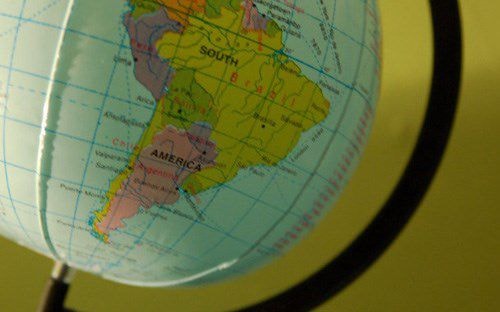EU competes with China in Latin America
With the theme “Creating a shared future to provide all citizens with a prosperous, united and livable society”, the European Union (EU)-Latin America and Caribbean Summit, which gathered leaders from 61 European, Latin American and Caribbean countries, concluded on June 11 (early morning of June 12, Hanoi time) in Brussels, Belgium.
 |
| South America |
The conference made many commitments on trade and tourism cooperation, including 800 million USD in funding from the European Union for the Community of Latin American and Caribbean States.
This figure of 800 million USD is actually nothing compared to the 250 billion USD that China had just pledged to the Latin American region not long ago. However, it is a great effort from the EU in the context of this region having just weakly overcome the public debt crisis and increasing division within the Eurozone countries.
With China and the United States increasingly exerting great influence in the Latin American and Caribbean region, Europe, as a powerful global bloc, feels vulnerable.
Therefore, this EU-Latin America and Caribbean Summit is an opportunity that the European Union cannot miss. In addition to increasing investment resources in this region, the European Union has reached an agreement with the Community of Latin American and Caribbean States to overcome the deadlock in negotiations with the MERCOSUR economic bloc including Brazil, Uruguay, Paraguay, Argentina, Venezuela to move towards signing a large-scale EU-Mercosur trade agreement.
EU-Mercosur negotiations on a free trade agreement began in 1999, but stalled in 2004 due to disagreements between the two sides over import tariffs to protect European agriculture.
European Commission President Jean-Claude Juncker was optimistic about the prospects of this renegotiation: “European Trade Commissioner Cecilia Malmstrom told me that everything is still on track and I hope that the negotiations on this issue will be concluded soon.”
According to the leaders of these two major economic blocs, the EU-Mercosur free trade agreement, if formed, will increase bilateral trade to 100 billion euros/year and benefit more than 700 million people.
In addition to the general agreements, the EU and Brazil also discussed a plan to build an undersea telecommunications fiber optic cable from Lisbon (Portugal) to Fortaleza worth 185 million USD, aiming to reduce Brazil's dependence on the US. Brazilian President Dilma Rousseff said that promoting cooperation with the EU is an opportunity for Brazil to escape the current economic and social crisis.
“We are quite worried about the current state of the economy. We are working to solve inflation and unemployment. Promoting cooperation projects with the EU, we have the resources to solve our problems, but at the same time we look at our problems in the light of the European Union’s experience in public debt and solving unemployment,” said President Rousseff.
At the Conference, European Union countries also signed visa exemption agreements for citizens of five Caribbean countries to attract tourists from these countries to Europe in the future.
Not only stopping at the ambition to promote trade, the EU also wants to seek "mutually beneficial" diplomatic relations with the Community of Latin American and Caribbean States, including Cuba, which is having conflicts of interest with the EU's close ally, the United States.
In a joint statement concluding the two-day EU-Community of Latin American and Caribbean States (EU-CELAC) Summit in Brussels, Belgium, the EU and Latin American countries stated: "In the current context, we hope that all necessary steps will be taken towards the early end of this embargo."
The sanctions have caused “unjustified humanitarian consequences” for the Cuban people and “are harming the legitimate development of economic relations between Cuba, the EU and other countries.”
Leaders of the three regions welcomed the announcement by US President Barack Obama and Cuban President Raul Castro last December that they would restore diplomatic relations between the two countries. Meanwhile, the EU and Cuba are expected to hold another round of talks in Brussels early next week (around June 15-16) in an effort to normalize bilateral relations./.
According to VOV.VN






